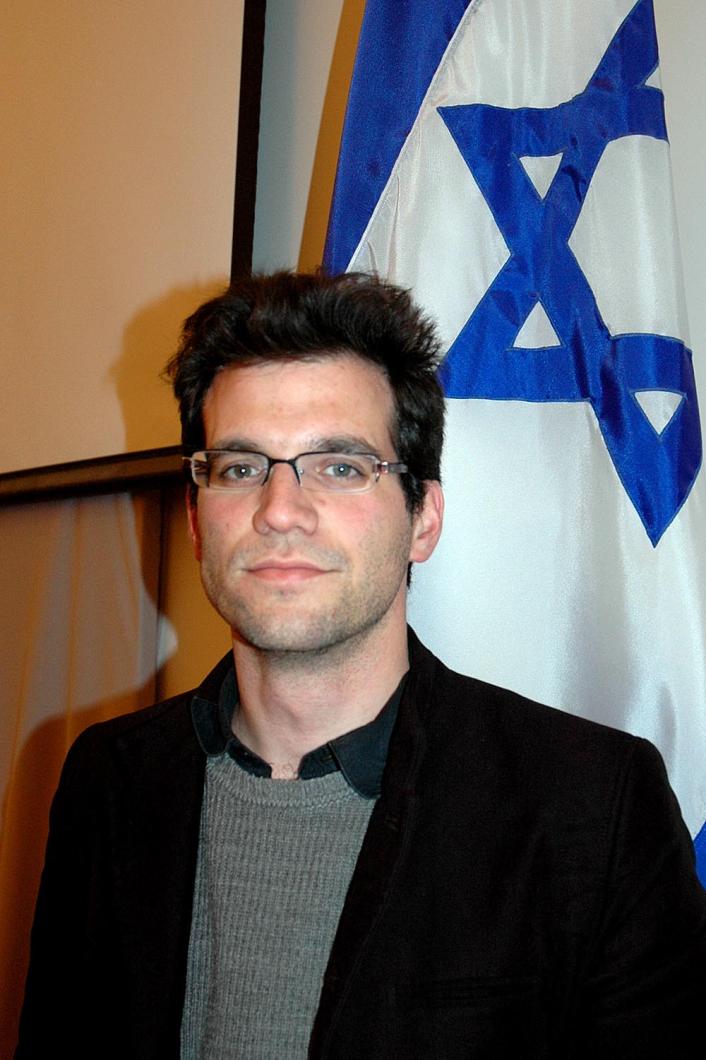Oded Na’Aman, a bespectacled 26-year-old in a brown corduroy blazer with the collar turned up towards a dark brown quiff, is telling an audience at Martha’s Vineyard Hebrew Centre about scaring people half to death.
“I told bad jokes and good jokes and they laughed just the same,” he says, “or they stood there shivering. Sometimes they would spontaneously apologize, just because they thought I might be displeased about something.”
The veteran soldier, who is touring parts of the U.S. as a member of Breaking The Silence — a group of Israeli soldiers giving personal testimonies on Israel’s mandatory three-year military service — preceded his talk Monday night with a 15-minute video. In the video, a handful of young soldiers discuss the importance of maintaining a climate of fear as they herd crowds of Palestinian would-be commuters at a West Bank checkpoint.
“Why are they disciplined?” asks a soldier in the video, addressing the camera. “Because they’re scared. Wouldn’t you be?”
The young Israelis who, though armed, are massively outnumbered at the checkpoints, admit to nearly constant nerves themselves. Footage of physical abuse in the video led to the arrest of several soldiers.
“I was constantly trying to be nice, which was ridiculous,” says Mr. Na’Aman, explaining how he struggled to maintain his sense of morality while carrying out duties which he felt meant abandoning his concern for others.
“Even a smile is a sign that they’re not scared of you,” he says, “and you’re not doing your job if you don’t punish them.” In the pursuit of the intimidation of Palestinian residents, he explains, the best punishments were often the most creative. “A fellow soldier told me that instead of a beating, he lined some people up one night and made them sing for him. It was effective.”
Mr. Na’Aman was here just for the night on Monday. He would take an early ferry off-Island to visit Brown University in the morning. The student is considering several U.S. colleges for a graduate course in philosophy, which he hopes to start in the fall.
He joined Breaking the Silence in 2005, a few months after the organization was established with a cause, described on their Web site, hovrimshtika.org, as “collecting the testimonies of soldiers who witness or participate in military actions which change them immensely.”
Mr. Na’Aman says the organization has encountered resistance from some within their country who claim their testimony represents a few bad apples and that, so long as a moral code is adhered to, military service in the West Bank and elsewhere should not lead to these incidences.
According to the speaker though, these moral red lines quickly become invisible.
“You get used to almost anything seeing everyone through the scope of your gun,” he says. “After three nights it is like a video game — it would be for all of us.”
He insists that he and his colleagues are patriotic soldiers with dual priorities: the security of their country’s borders and the security of its conscience. “The army denies this stuff but they should say, ‘This is what happens. If you have a problem with it, it’s your problem,’” he says. “Society should not ignore it.”
The budding operation has recently expanded to include talks such as Mr. Na’Aman’s; exhibitions of soldier photography within Israel; and, in the past few months, weekly tours of Hebron, a volatile area made up of about 800 Jewish settlers and some 200,000 Palestinians.
As Mr. Na’Aman explains, expanding the talks to America is an important step. “Top to bottom, gun to helmet, everything I owned as a soldier was made in the U.S.,” he says. “This country in general has huge power over what’s going on there.”
Audience member Doron Katzman, a Vineyarder born in Israel, remembers a very different scenario when he served as an 18-year-old in 1974. “I was manning an anti-aircraft gun when we were still at war with Egypt, and there was a feeling you could be invaded at any time,” he says. “It was part of growing up. You didn’t question it. Now there’s occupation, there’s no other word for it. Would I serve now? I don’t know. It’s a good question.”
Perching on an audience seat after the talk, tonight’s speaker sums up the confusing dilemma he faced as a modern-day soldier. “The thing is, you can be gentle and sensitive and be cruel at the same time,” he says. “Just by standing there with a gun. I’m not cruel ... I mean, I try not to be cruel. But you have to be cruel, it’s your job.”




Comments
Comment policy »